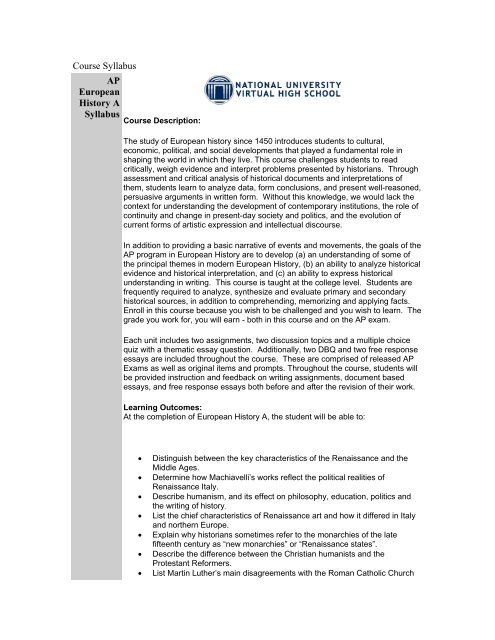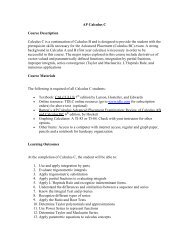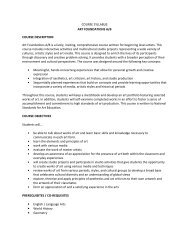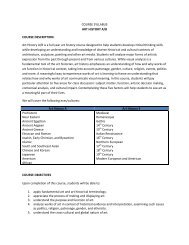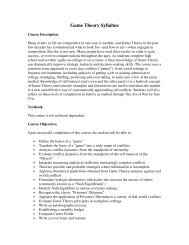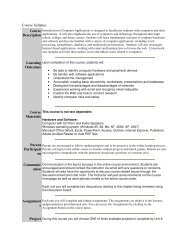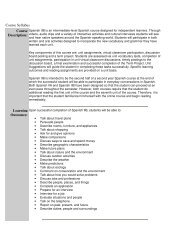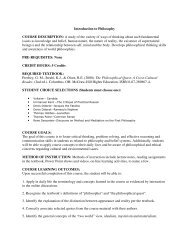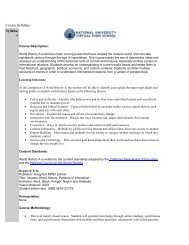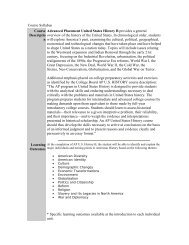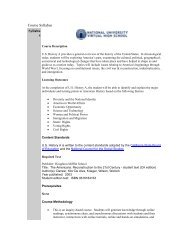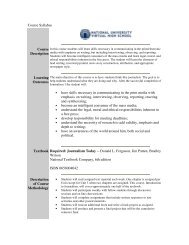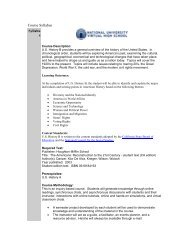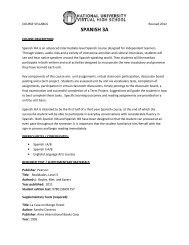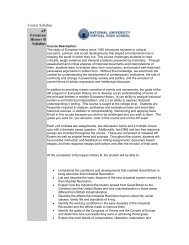AP European History A - National University Virtual High School
AP European History A - National University Virtual High School
AP European History A - National University Virtual High School
Create successful ePaper yourself
Turn your PDF publications into a flip-book with our unique Google optimized e-Paper software.
Course Syllabus<br />
<strong>AP</strong><br />
<strong>European</strong><br />
<strong>History</strong> A<br />
Syllabus Course Description:<br />
The study of <strong>European</strong> history since 1450 introduces students to cultural,<br />
economic, political, and social developments that played a fundamental role in<br />
shaping the world in which they live. This course challenges students to read<br />
critically, weigh evidence and interpret problems presented by historians. Through<br />
assessment and critical analysis of historical documents and interpretations of<br />
them, students learn to analyze data, form conclusions, and present well-reasoned,<br />
persuasive arguments in written form. Without this knowledge, we would lack the<br />
context for understanding the development of contemporary institutions, the role of<br />
continuity and change in present-day society and politics, and the evolution of<br />
current forms of artistic expression and intellectual discourse.<br />
In addition to providing a basic narrative of events and movements, the goals of the<br />
<strong>AP</strong> program in <strong>European</strong> <strong>History</strong> are to develop (a) an understanding of some of<br />
the principal themes in modern <strong>European</strong> <strong>History</strong>, (b) an ability to analyze historical<br />
evidence and historical interpretation, and (c) an ability to express historical<br />
understanding in writing. This course is taught at the college level. Students are<br />
frequently required to analyze, synthesize and evaluate primary and secondary<br />
historical sources, in addition to comprehending, memorizing and applying facts.<br />
Enroll in this course because you wish to be challenged and you wish to learn. The<br />
grade you work for, you will earn - both in this course and on the <strong>AP</strong> exam.<br />
Each unit includes two assignments, two discussion topics and a multiple choice<br />
quiz with a thematic essay question. Additionally, two DBQ and two free response<br />
essays are included throughout the course. These are comprised of released <strong>AP</strong><br />
Exams as well as original items and prompts. Throughout the course, students will<br />
be provided instruction and feedback on writing assignments, document based<br />
essays, and free response essays both before and after the revision of their work.<br />
Learning Outcomes:<br />
At the completion of <strong>European</strong> <strong>History</strong> A, the student will be able to:<br />
• Distinguish between the key characteristics of the Renaissance and the<br />
Middle Ages.<br />
• Determine how Machiavelli’s works reflect the political realities of<br />
Renaissance Italy.<br />
• Describe humanism, and its effect on philosophy, education, politics and<br />
the writing of history.<br />
• List the chief characteristics of Renaissance art and how it differed in Italy<br />
and northern Europe.<br />
• Explain why historians sometimes refer to the monarchies of the late<br />
fifteenth century as “new monarchies” or “Renaissance states”.<br />
• Describe the difference between the Christian humanists and the<br />
Protestant Reformers.<br />
• List Martin Luther’s main disagreements with the Roman Catholic Church
and explain why his movement spread so quickly across Europe.<br />
• Identify the main elements of Lutheranism, Zwinglianism, Calvinism, and<br />
Anabaptism, and describe in what ways they differed from each other and<br />
from Catholicism.<br />
• Explain the impact Protestant Reformation had on the society of the<br />
sixteenth century.<br />
• Identify the measures the Roman Catholic church took to reform itself and<br />
combat Protestantism in the sixteenth century.<br />
• Explain why <strong>European</strong>s began to amass overseas empires during the<br />
sixteenth century and describe the effects this experience had on both the<br />
<strong>European</strong>s and conquered peoples.<br />
• Draw conclusions about the role of religion in the <strong>European</strong> wars of the<br />
sixteenth century and the Thirty Years’ War of the seventeenth century.<br />
• Distinguish how the religious policy, the foreign policy and the governments<br />
of Philip II of Spain and Elizabeth I of England differed.<br />
• List and describe the economic and social crises Europe experienced<br />
between 1560 and 1650.<br />
• Identify how the turmoil in Europe between 1560 and 1650 contributed to<br />
the witchcraft craze and to the artistic and intellectual developments of the<br />
period.<br />
• Describe the theories of government proposed by Jacques Bossuet,<br />
Thomas Hobbes and John Locke, and explain how their respective<br />
theories reflected the concerns and problems of the seventeenth century.<br />
• Explain absolutism in theory and describe how its actual practice in France<br />
differed from the theory.<br />
• Identify the developments that enabled Brandenburg-Prussia, Austria and<br />
Russia to emerge as major powers in the seventeenth century.<br />
• Identify the main issues in the struggle between king and Parliament in<br />
seventeenth-century England and explain how they were resolved.<br />
• Describe the role the Netherlands played in the political, economic and<br />
artistic life of the seventeenth century.<br />
• Trace the developments during the Middle Ages and Renaissance that<br />
contributed to the Scientific Revolution of the seventeenth century.<br />
• Identify what Copernicus, Kepler, Galileo and Newton contributed to a new<br />
vision of the universe and describe how it differed from the Ptolemaic<br />
conception of the universe.<br />
• Draw conclusions about the role of women in the Scientific Revolution.<br />
• Explain the problems the Scientific Revolution presented for organized<br />
religion and how both the church and the emerging scientists attempted to<br />
solve these problems.<br />
• Identify how the ideas of the Scientific Revolution were disseminated and<br />
the impact they had on society.<br />
• Identify the intellectual developments that led to the emergence of the<br />
Enlightenment.<br />
• List the leading figures of the Enlightenment and identify their main<br />
contributions.<br />
• Describe the type of social environment in which the philosophes thrived<br />
and the role that women played in this environment.<br />
• Explain the innovations in art, music and literature that occurred in the<br />
eighteenth century.<br />
• Draw conclusions about how popular culture and popular religion differed<br />
from high culture and institutional religion in the eighteenth century.<br />
• Define what historians mean by the term enlightened absolutism and<br />
explain to what degree eighteenth century Prussia, Austria and Russia
exhibited its characteristics.<br />
• Explain the concept of “balance of power” and “reason of state” and how<br />
these ideas influenced international relations in the eighteenth century.<br />
• List the causes and results of the Seven Years’ War.<br />
• Identify the changes that occurred in agriculture, finance, industry and<br />
trade during the eighteenth century.<br />
• Describe the main groups making up the <strong>European</strong> social order in the<br />
eighteenth century and explain how the conditions in which they lived<br />
differed both between groups and between different parts of Europe.<br />
• Identify the causes and results of the American Revolution and what<br />
impact it had on Europe.<br />
• Explain the long-range and immediate causes of the French Revolution.<br />
• Trace the main events of the French Revolution between 1789 and 1799.<br />
• Identify and explain the role of each of the following in the French<br />
Revolution: lawyers, peasants, women, the clergy, the Jacobins, the sansculottes,<br />
the French Revolutionary Army and the Committee of Public<br />
Safety.<br />
• Draw conclusions about what aspects of the French Revolution Napoleon<br />
preserved and/or destroyed.<br />
Content Standards:<br />
This Advanced Placement <strong>European</strong> <strong>History</strong> course is written to the content<br />
standards outlined by the College Board’s <strong>AP</strong> <strong>European</strong> <strong>History</strong> Course<br />
Requirements.<br />
Prerequisites:<br />
At least a B in most recent social studies course and good writing skills.<br />
Required Texts:<br />
Primary Text:<br />
Title: Western Civilization<br />
Author(s): Spielvogel<br />
Publisher: Holt, Rinehart & Winston<br />
Year published: 2003<br />
ISBN 00534600069<br />
Textbook Companion Site<br />
Student Supplements:<br />
Title: Classics of Western Thought – The Modern World, Vol. III (4 th edition)<br />
Author(s): Knoebel<br />
Publisher: Wadsworth<br />
Year published: 1998<br />
ISBN 0155076841<br />
Title: The Other Side of Western Civilization – Readings in Everyday Life, Vol. II<br />
(3 rd edition)<br />
Author(s): Stearns<br />
Publisher: Harcourt College Publishers<br />
Year published: 1984<br />
ISBN 0155676520
Course Methodology:<br />
This is an inquiry-based course where you will discover and utilize knowledge of<br />
<strong>European</strong> history via the textbook, videos, and other readings, along with websites,<br />
and synchronous and asynchronous discussions with other students and the<br />
instructor.<br />
Acting as a facilitator, your instructor will guide you through the process; however,<br />
as the learner, you are responsible for actively acquiring and constructing<br />
knowledge by completing all assigned readings and activities.<br />
Both formal and informal assessment will be used in evaluating your performance<br />
throughout the course. Informal assessment will include an evaluation of the quality<br />
and timeliness of your participation in class activities. Formal assessment will<br />
involve multiple-choice quizzes, written essays, timed writings, and a final exam.<br />
Unit Topic Activities<br />
1 Recovery and<br />
Rebirth: The<br />
Age of the<br />
Renaissance<br />
Themes:<br />
• Meaning and Characteristics of the Italian<br />
Renaissance<br />
• The Making of Renaissance Society<br />
• The Italian States in the Renaissance<br />
• The Intellectual Renaissance in Italy<br />
• The Artistic Renaissance<br />
• The <strong>European</strong> State in the Renaissance<br />
• The Church in the Renaissance<br />
Lecture: The Age of the Renaissance<br />
Study Guide:<br />
• Self-assessment questions<br />
• Glossary of terms/individuals/events<br />
• Additional terms/individuals/events<br />
• Resources (chapter outlines, flash cards,<br />
interactive maps, Web links and interactive<br />
crossword puzzles)<br />
Required Reading:<br />
• Spielvogel text: Chapter 12<br />
Required Viewing: Western Tradition Video Series<br />
• 23 – The Late Middle Ages<br />
• 24 – The <strong>National</strong> Monarchies<br />
• 25 – The Renaissance and the Age of<br />
Discovery<br />
• 26 – The Renaissance and the New World
Additional Reading:<br />
• Knoebel text:<br />
o Dialogue Concerning the Two Chief<br />
World Systems by Galileo Galilei<br />
o The New Scientific Method by Francis<br />
Bacon<br />
o Discourse on Method by René<br />
Descartes<br />
• Stearns’ text:<br />
o Premodern People 1550-1750<br />
o The Peasantry: Material Life and<br />
Rational Controls by Keith Wrightson<br />
and David Levine<br />
o Popular Religion in Preindustrial<br />
Society by Natalie Zemon Davis<br />
o Witchcraft and Social Tensions in<br />
Europe by Edward Bever<br />
Assignments:<br />
• Renaissance Art<br />
• The Role of Man in Renaissance Society<br />
Threaded Discussion Forum Topics:<br />
• Learning Styles Assessment<br />
• The Renaissance Papacy<br />
• The Medici – Villains or Heroes?<br />
Assessment:<br />
• Quiz (20 multiple choice items and one essay<br />
question)<br />
• Timed Writing – Free Response Essay 1<br />
2 The Age of<br />
Reformation<br />
Themes:<br />
• Prelude to Reformation: The Northern<br />
Renaissance<br />
• Prelude to Reformation: Church and Religion<br />
on the Eve of the Reformation<br />
• Martin Luther and the Reformation in Germany<br />
• Germany and the Reformation: Religion and<br />
Politics<br />
• The Spread of the Protestant Reformation<br />
• The Social Impact of the Protestant Reformation<br />
• The Catholic Reformation<br />
Lecture: The Age of Reformation
Study Guide:<br />
• Self-assessment questions<br />
• Glossary of terms/individuals/events<br />
• Additional terms/individuals/events<br />
• Resources (chapter outlines, flash cards,<br />
interactive maps, Web links and interactive<br />
crossword puzzles)<br />
Required Reading:<br />
• Spielvogel text: Chapter 13<br />
Required Viewing: Western Tradition Video Series<br />
• 27 – The Reformation<br />
• 28 – The Rise of the Middle Class<br />
Additional Reading:<br />
• Knoebel text:<br />
o Leviathan by Thomas Hobbes<br />
o Thoughts by Blaise Pascal<br />
o An Essay Concerning Human<br />
Understanding by John Locke<br />
• Stearns’ text:<br />
o Religion and the Decline of Magic by<br />
Keith Thomas<br />
o The World We Have Lost by Peter<br />
Laslett<br />
o Premodern Families by David Hunt<br />
Assignments:<br />
• The Protestant Revolt: A Move towards the<br />
Unknown<br />
• Politics and Lutheranism<br />
• Revision Assignment – Free Response Essay 1<br />
Threaded Discussion Forum Topics:<br />
• Luther – Revolutionary or Conservative?<br />
• Wars of Religion<br />
Assessment:<br />
• Quiz (20 multiple choice items and one essay<br />
question)<br />
3 Discovery and<br />
Crisis in the<br />
Sixteenth and<br />
Themes:
Seventeenth<br />
Centuries<br />
• An Age of Discovery and Expansion<br />
• Politics and the Wars of Religion in the<br />
Sixteenth Century<br />
• Economic and Social Crises<br />
• Seventeenth-Century Crises: War and<br />
Rebellions<br />
• The Witchcraft Craze<br />
• Culture in a Turbulent World<br />
Lecture: Discovery and Crisis in the Sixteenth and<br />
Seventeenth Centuries<br />
Study Guide:<br />
• Self-assessment questions<br />
• Glossary of terms/individuals/events<br />
• Additional terms/individuals/events<br />
• Resources (chapter outlines, flash cards,<br />
interactive maps, Web links and interactive<br />
crossword puzzles)<br />
Required Reading:<br />
• Spielvogel text: Chapter 14<br />
Required Viewing: Western Tradition Video Series<br />
• 29 – The Wars of Religion<br />
• 28 – The Rise of the Trading Cities<br />
Additional Reading:<br />
• Knoebel text:<br />
o Of Civil Government by John Locke<br />
o Essay on Man by Alexander Pope<br />
o Candide by Voltaire<br />
• Stearns’ text:<br />
o Popular Recreations in English Society<br />
by Robert Malcolmson<br />
o Early Industrialization 1750-1850<br />
o A New Definition of Home Sweet Home<br />
by Carole Shammas<br />
Assignments:<br />
• Witchcraft<br />
• Thirty Years’ War: Last Religious War or First<br />
Modern One?<br />
Threaded Discussion Forum Topics:
• Economy of the Eighteenth Century<br />
• <strong>European</strong> Exploration<br />
Assessment:<br />
• Quiz (20 multiple choice items and one essay<br />
question)<br />
• Timed Writing – DBQ 1<br />
4 State Building<br />
and the<br />
Search for<br />
Order in the<br />
Seventeenth<br />
Century<br />
Themes:<br />
• The Theory of Absolutism<br />
• Absolutism in Western Europe<br />
• Absolutism in Central, Eastern and Northern<br />
Europe<br />
• Limited Monarchy and Republics<br />
• Economic Trends: Mercantilism and <strong>European</strong><br />
Colonies in the Seventeenth Century<br />
• The World of Seventeenth-Century Culture<br />
Lecture: State Building and the Search for Order in the<br />
Seventeenth Century<br />
Study Guide:<br />
• Self-assessment questions<br />
• Glossary of terms/individuals/events<br />
• Additional terms/individuals/events<br />
• Resources (chapter outlines, flash cards,<br />
interactive maps, Web links and interactive<br />
crossword puzzles)<br />
Required Reading:<br />
• Spielvogel text: Chapter 15<br />
Required Viewing: Western Tradition Video Series<br />
• 31 – The Age of Absolutism<br />
• 32 – Absolutism and the Social Contract<br />
Additional Reading:<br />
• Knoebel text:<br />
o On the Origin of Inequality Among Men<br />
by Jean Jacques Rousseau<br />
o On Education by Jean Jacques<br />
Rousseau<br />
o On Crimes and Punishments by Cesare<br />
Beccaria<br />
• Stearns’ text:<br />
o The Rise of Romantic Love by Jean-
o<br />
o<br />
o<br />
Louis Flandrin<br />
A Sexual Revolution? A Dispute<br />
The Argument for Revolution by<br />
Edward Shorter<br />
The Argument Against Revolution by<br />
Louse A. Tilly, Joan W. Scott and<br />
Miriam Cohen<br />
Assignments:<br />
• The Emergence of the Modern State<br />
• Scrambled Sentences – Constructing an Essay<br />
• Revision Assignment – DBQ 1<br />
Threaded Discussion Forum Topics:<br />
• Peter Romanov vs. Louis XIV<br />
• Dutch Commercialism<br />
Assessment:<br />
• Quiz (20 multiple choice items and one essay<br />
question)<br />
5 The Scientific<br />
Revolution<br />
and the<br />
Emergence of<br />
Modern<br />
Science<br />
Themes:<br />
• Background to the Scientific Revolution<br />
• Toward a New Heaven: A Revolution in<br />
Astronomy<br />
• Advanced in Medicine<br />
• Women in the Origins of Modern Science<br />
• Toward a New Earth: Descartes, Rationalism<br />
and a New View of Humankind<br />
• The Scientific Method<br />
• Science and Religion in the Seventeenth<br />
Century<br />
• The Spread of Scientific Knowledge<br />
Lecture: The Scientific Revolution and the Emergence<br />
of Modern Science<br />
Study Guide:<br />
• Self-assessment questions<br />
• Glossary of terms/individuals/events<br />
• Additional terms/individuals/events<br />
• Resources (chapter outlines, flash cards,<br />
interactive maps, Web links and interactive<br />
crossword puzzles)<br />
Required Reading:
• Spielvogel text: Chapter 16<br />
Required Viewing: Western Tradition Video Series<br />
• 33 – The Enlightened Despots<br />
• 34 – The Enlightenment<br />
Additional Reading:<br />
• Knoebel text:<br />
o Wealth of Nations by Adam Smith<br />
o The Progress of the Human Mind by<br />
Antoine Nicolas de Condorcet<br />
o Reflections on the Revolution in France<br />
by Edmund Burke<br />
• Stearns’ text:<br />
o A New World of Children by J. H. Plumb<br />
o The Rise of Modern Medicine by Pierre<br />
Goubert<br />
o The Insane in Modern Society by<br />
Andrew Scull<br />
Assignments:<br />
• The Scientific Revolution: The Search for<br />
Meaning<br />
• Newtonian World-Machine<br />
Threaded Discussion Forum Topics:<br />
• Renaissance to Revolution<br />
• Scientific Revolution – Revolutionary?<br />
Assessment:<br />
• Quiz (20 multiple choice items and one essay<br />
question)<br />
• Timed Writing – DBQ 2<br />
6 The<br />
Eighteenth<br />
Century: An<br />
Age of<br />
Enlightenment<br />
Themes:<br />
• The Enlightenment<br />
• Culture and Society in an Age of Enlightenment<br />
• Religion and the Churches<br />
Lecture: The Eighteenth Century: An Age of<br />
Enlightenment<br />
Study Guide:<br />
• Self-assessment questions
• Glossary of terms/individuals/events<br />
• Additional terms/individuals/events<br />
• Resources (chapter outlines, flash cards,<br />
interactive maps, Web links and interactive<br />
crossword puzzles)<br />
Required Reading:<br />
• Spielvogel text: Chapter 17<br />
Required Viewing: Western Tradition Video Series<br />
• 35 – The Enlightenment and Society<br />
• 36 – The Modern Philosophers<br />
Additional Reading:<br />
• Knoebel text:<br />
o Faust by Johann Wolfgang von Goethe<br />
o Romantic Poetry by William<br />
Wordsworth, John Keats, Heinrich<br />
Heine and Walt Whitman<br />
• Stearns’ text:<br />
o The Middle Class in France by<br />
Theodore Zeldin<br />
o The Changing Nature of Protest by<br />
Charles Tilly, Louise Tilly and Richard<br />
Tilly<br />
Assignments:<br />
• The Enlightenment: The Best of All Possible<br />
Worlds<br />
• Feminist Ideas: Then and Now<br />
• Revision Assignment – DBQ 2<br />
Threaded Discussion Forum Topics:<br />
• A Better Approach to Life<br />
• Still Enlightened?<br />
Assessment:<br />
• Quiz (20 multiple choice items and one essay<br />
question)<br />
7 The<br />
Eighteenth<br />
Century:<br />
<strong>European</strong><br />
States,<br />
International<br />
Themes:<br />
• The <strong>European</strong> States<br />
• Wars and Diplomacy<br />
• Economic Expansion and Social Change
Wars and<br />
Social Change<br />
• The Social Order of the Eighteenth Century<br />
Lecture: The Eighteenth Century: <strong>European</strong> States,<br />
International Wars and Social Change<br />
Study Guide:<br />
• Self-assessment questions<br />
• Glossary of terms/individuals/events<br />
• Additional terms/individuals/events<br />
• Resources (chapter outlines, flash cards,<br />
interactive maps, Web links and interactive<br />
crossword puzzles)<br />
Required Reading:<br />
• Spielvogel text: Chapter 18<br />
Required Viewing: Western Tradition Video Series<br />
• 37 – The American Revolution<br />
• 36 – The American Republic<br />
Additional Reading:<br />
• Knoebel text:<br />
o Democracy in America by Alexis de<br />
Tocqueville<br />
o Walden and Civil Disobedience by<br />
Henry David Thoreau<br />
• Stearns’ text:<br />
o Part 3 – Mature Industrial Society 1850-<br />
1918<br />
o Middle-Class Women by Patricia<br />
Branca<br />
o Crime and Modern Society by Vincent<br />
McHale and Eric A. Johnson<br />
Assignments:<br />
• The Aristocracy Plays at War<br />
• Enlightened Despotism?<br />
Threaded Discussion Forum Topics:<br />
• Remedying Poverty<br />
• You’re the Advisor (to Joseph II or Catherine<br />
the Great)<br />
Assessment:
• Quiz (20 multiple choice items and one essay<br />
question)<br />
8 A Revolution<br />
in Politics:<br />
The Era of the<br />
French<br />
Revolution<br />
and Napoleon<br />
Themes:<br />
• The Beginnings of the Revolutionary Era: The<br />
American Revolution<br />
• Background to the French Revolution<br />
• The French Revolution<br />
• The Age of Napoleon<br />
Lecture: A Revolution in Politics: The Era of the French<br />
Revolution and Napoleon<br />
Study Guide:<br />
• Self-assessment questions<br />
• Glossary of terms/individuals/events<br />
• Additional terms/individuals/events<br />
• Resources (chapter outlines, flash cards,<br />
interactive maps, Web links and interactive<br />
crossword puzzles)<br />
Required Reading:<br />
• Spielvogel text: Chapter 19<br />
Required Viewing: Western Tradition Video Series<br />
• 39 – The Death of the Old Regime<br />
• 36 – The French Revolution<br />
Additional Reading:<br />
• Knoebel text:<br />
o On Liberty and Utilitarianism by John<br />
Stuart Mill<br />
o Reason in <strong>History</strong> by Georg Wilhelm<br />
Friedrich Hegel<br />
• Stearns’ text:<br />
o New Leisure: Sports by William J.<br />
Baker<br />
o Modern Leisure, Middle-Class Style by<br />
Peter Bailey<br />
o Popular Education: Peasants into<br />
Frenchmen by Eugen Weber<br />
Assignments:<br />
• What Happened When?
• In Your Own Words: Liberty, Equality and<br />
Fraternity<br />
Threaded Discussion Forum Topics:<br />
• It Takes a Revolution<br />
• Liberty, Equality or Fraternity: Which is most<br />
important?<br />
Assessment:<br />
• Quiz (20 multiple choice items and one essay<br />
question)<br />
• Timed Writing – Free Response Essay 2<br />
Assessment<br />
Activity<br />
Points<br />
Assignments (16)<br />
10 points each<br />
Threaded Discussion Forums (16) 10 points each<br />
Quizzes (8)<br />
Units 1-7 – 25 points each<br />
Unit 8 – 85 points<br />
Timed Writings – DBQ/FRE (4)<br />
50 points each<br />
Essay Revisions (3)<br />
10 points each<br />
Synchronous Discussions<br />
Instructor determined<br />
Points Possible: 810<br />
Grading Scale<br />
Letter Grade Percentage Earned<br />
A 90% - 100%<br />
B 80% - 89%<br />
C 70% - 79%<br />
D 60% - 69%<br />
F<br />
59% and lower<br />
Student’s Role and Responsibilities in this Course<br />
Expectations:<br />
Students are expected to conduct themselves in a responsible manner that reflects<br />
sound ethics, honor, and good citizenship. It is the student’s responsibility to<br />
maintain academic honesty and integrity and to manifest their commitment to the<br />
goals of NUVHS through their conduct and behavior. Students are expected to<br />
abide by all NUVHS policies and regulations. Any form of academic dishonesty, or<br />
inappropriate conduct by students or applicants may result in penalties ranging
from warning to dismissal, as deemed appropriate by NUVHS.<br />
Communication:<br />
Throughout this course students will need to be in close contact with their instructor<br />
and fellow students. Students are expected to communicate via email and<br />
electronic discussion boards. Therefore, students should plan on checking email at<br />
least three times a week and participate in the discussion boards during the weeks<br />
they are live.<br />
Instructors strongly encourage and welcome open communication. Clear,<br />
consistent, and proactive communication will ensure a successful experience in this<br />
course. It is the student’s responsibility to notify the instructor immediately if and<br />
when a personal situation occurs that affects your performance in this class. Being<br />
proactive with communication will result in a quick solution to any problems that<br />
may occur.<br />
Technical Support is offered through Spectrum Pacific Learning Company (SPLC).<br />
Should a student need any technical assistance, he/she should email the Help<br />
Desk as soon as possible at helpdesk@myonlinelogin.com or call 1-877-252-<br />
7715. SPLC will help resolve technical problems and walk through the solution<br />
with students. If a problem persists for more than 48 hours, the student must also<br />
notify their teacher and NUVHS.<br />
Time Required For This Course:<br />
To complete this course in eight weeks, students should plan to allocate at least<br />
12-15 hours a week on assigned readings, assignments, discussions<br />
(asynchronous and synchronous), quizzes, and exams.<br />
NUVHS wishes every student great success in their online class. Please contact<br />
us at 1.866.366.8847 if any questions arise.<br />
NUVHS<br />
Expected<br />
<strong>School</strong>wide<br />
Learning<br />
Results<br />
(ESLRs)<br />
NUVHS Expected <strong>School</strong>wide Learning Results (ESLRs):<br />
It is anticipated that NUVHS students will be:<br />
Engaged Learners<br />
1. Demonstrate self-directed learning skills such as time management, and personal<br />
responsibility through the completion of course requirements<br />
2. Develop an understanding of their own preferred learning styles to enhance their<br />
overall academic potential<br />
3. Incorporate effective and relevant internet and multimedia resources in their<br />
learning process to broaden their knowledge base<br />
Critical Thinkers<br />
1. Effectively analyze and articulate sound opinions on a variety of complex concepts<br />
2. Illustrate a variety of problem-solving strategies that strengthen college preparation<br />
and workforce readiness<br />
3. Formulate a framework for applying a variety of technology and internet-based<br />
research to enhance information literacy and collaborative thinking
Effective Communicators<br />
1. Demonstrate awareness and sensitivity to tone and voice in multiple forms of<br />
communication<br />
2. Express concepts and ideas in a variety of forms<br />
3. Enhance communiccation skills through the use of media rich or other technology<br />
resources<br />
Global Citizens<br />
1. Appreciate the value of diversity<br />
2. Understand the range of local and international issues facing today's global<br />
community<br />
3. Demonstrate awareness of the importance of cultural sensitivity and social<br />
responsibility in the 21st century


